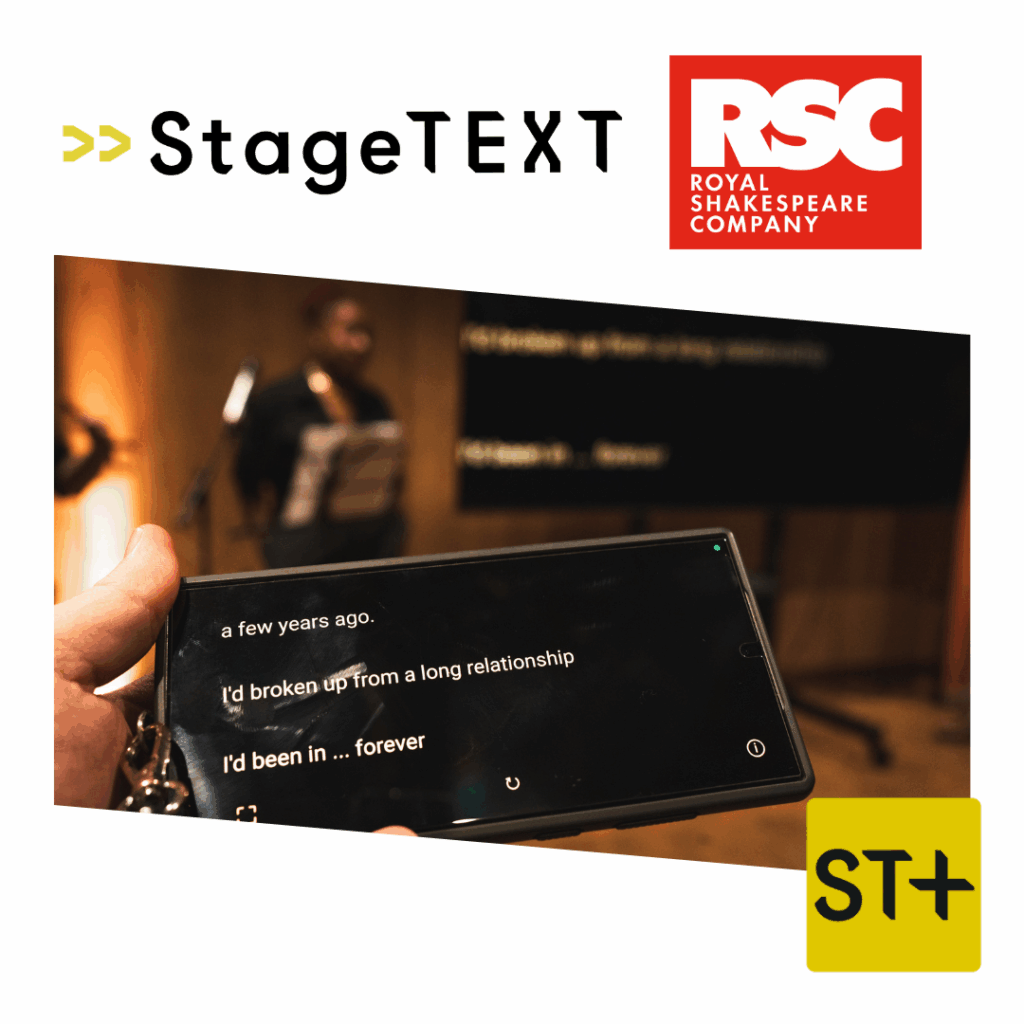Stagetext, the UK’s leading deaf-led charity for theatre captioning, is working with the Royal Shakespeare Company (RSC) to transform how theatres provide access for deaf audiences across the country.
After a successful trial at Mercury Theatre in Colchester, Stagetext is now rolling out its new software, Stagetext+, with the RSC as an early adopter.
Designed for deaf audiences, Stagetext+ delivers captions simultaneously across multiple devices – from caption boxes and LED screens to tablets and mobile phones – giving audiences more choice over how they access captions, whilst retaining Stagetext’s standards for quality, accuracy and timing.
At a time when some organisations are turning to AI-generated captions, Stagetext remains committed to quality deaf access. All captions delivered through Stagetext+ continue to be created by qualified Captioners and Operators, enabling deaf audience members to have the same equal experience as their hearing friends and family.
This new phase with the RSC marks an important milestone in 25 years of Stagetext pioneering theatre captioning in UK theatres. Its two-year partnership with the Mercury Theatre demonstrated a new, cost-effective model that enables in-house Operators to deliver repeat captioned performances, giving venues more flexibility and giving deaf audiences greater choice in how they view captions.
With 18 million adults in the UK who are deaf, deafened or hard of hearing, that’s 1 in 3 people, Stagetext’s work addresses a significant and growing need. Many venues continue to cite budget limitations as a barrier to offering consistent captioned performances, and Stagetext+ has been developed specifically to help make high-quality access more affordable and more widely available.
Stagetext CEO Melanie Sharpe said: “Stagetext’s vision has always centred on innovation and on expanding equal access for deaf audiences. After successfully completing the first phase of Stagetext+, we are thrilled to be working with the RSC on its family production of The BFG this Christmas in Stratford. Stagetext+ brings deaf access to the whole family – whether you’re a hard-of-hearing grandparent or a deaf child – ensuring that everyone can share the joy of theatre together.”
We’re very excited about this collaboration as we can further test Stagetext+ on a variety of performances and realise our ambition of bringing more captions more often to audiences who have previously felt excluded – including those who are neurodivergent or have English as an additional language.”
Josefa Hunter MacKinnon, Creative Programme Developer at the RSC said: “It’s fitting that we are working with Stagetext now, as 25 years ago we worked with Stagetext to bring the first ever captioned theatre show to the UK. We are proud to be collaborating with them again helping to bring additional captioning to our venue. It’s the perfect opportunity to test multiple ways of viewing captioning. We always want our audiences to feel they are valued and included in the joys of experiencing theatre and we look forward to reviewing the positive impact this will have!”
Co-Chair of the board of Trustees for Stagetext, Sophie Ede said: ““How glorious to be leading Stagetext on its 25th anniversary. As a deaf chair of a national charity, I wish to publicly say thank you to the founders of Stagetext who have enabled me to enjoy theatre for the last 20 years of my life.
Without Stagetext I would have been excluded and isolated from enjoying the sociable side of going to the theatre. I am proud to be working with a dedicated staff team to bring about this new way to deliver captions in the face of ongoing financial restrictions and challenges within the arts and cultural sector.”
Steve Mannix, Chief Executive of the Mercury Theatre in Colchester said: “Working with Stagetext has given us a chance to embed access at the heart of the creative process and everything we do. The Mercury has the first trained Operator in the UK who can deliver repeat captioned performances. We’re delighted that this has worked so well and we’re able to truly embody more access more often.”
Read more on Stagetext+



